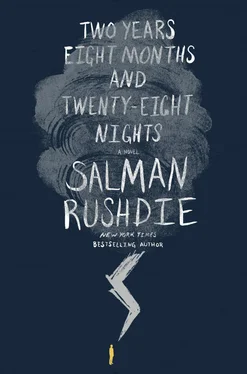On the day that Adam and Eve invented god, the article continued, they at once lost control of him. That is the beginning of the secret history of the world. Man and Woman invented god, who at once eluded their grasp and became more powerful than his creators, and also more malevolent. Like the supercomputer in the film Terminator: “Skynet,” sky-god, same thing. Adam and Eve were filled with fear, because it was plain that for the rest of time god would come after them to punish them for the crime of having created him. They came into being simultaneously in a garden, Eve and Adam, fully grown and naked and enjoying you could say the first Big Bang, and they had no idea how they got there until a snake led them to the tree of the knowledge of good and evil and when they ate its fruit they both simultaneously came up with the idea of a creator-god, a good-and-evil decider, a gardener-god who made the garden, otherwise where did the garden come from, and then planted them in it like rootless plants.
And lo, there, immediately, was god, and he was furious, “How did you come up with the idea of me,” he demanded, “who asked you to do that?” and he threw them out of the garden, into, of all places, Iraq. “No good deed goes unpunished,” said Eve to Adam, and that ought to be the motto of the entire human race.
The name “Casterbridge” was an invention. The great composer came from an immigrant family of Iberian Jews, and was a strikingly handsome man with a grand, sonorous voice and the bearing of a king. He also shared the most unusual physical characteristic of his kin: he had no earlobes. He was not a man to be trifled with, though his loyalties were as fierce as his enmities, and he was capable of profound loyalty and friendship. His smile was a thing of menacing, almost feral sweetness, a smile that could bite your head off. His politeness was terrifying. His two most endearing qualities were his Rottweiler obstinacy and his rhinoceros-thick hide. Once he had an idea between his teeth, nothing would induce him to yield it up, and the ridicule with which the new Post-Atheism was received did not deter him in the slightest. He was asked on late-night American TV if he was actually saying that the Supreme Being was fictional, and that this fictional divinity had now decided, for undisclosed reasons, to torment the human race. “Exactly,” he said with great firmness. “That’s exactly right. The triumph of the destructive irrational manifests itself in the form of an irrationally destructive god.” The talk-show host whistled between the famous gap in his central upper incisors. “Whew,” he said. “And here I was thinking the Brits were better educated than us.”
“Suppose,” said Hugo Casterbridge, “that one day god sent a storm, such a storm as could shake loose the moorings of the world, a storm which told us to take nothing for granted, not our power, not our civilization, not our laws, because if nature could rewrite its laws, break its bounds, change its nature, then our constructs, so puny in comparison, stood no chance. And this is the great test we face — our world, its ideas, its culture, its knowledge and laws, is under attack by the illusion we collectively created, the supernatural monster we ourselves unleashed. Plagues will be sent, like those sent to Egypt. But this time, there will be no request to let my people go. This god is not a liberator but a destroyer. He has no commandments. He’s over all that. He’s sick of us, the way he was in Noah’s time. He wants to make an example. He wants to do us in.”
“And we’ll be right back,” said the talk-show host, “after these messages.”
In certain quarters the quest for scapegoats had begun. It was important to know whose fault all this was. It was important to know if things were going to get worse. Maybe there were identifiable persons, destabilizing persons, who were somehow responsible for the destabilized world. Maybe these were persons carrying within themselves some sort of genetic mutation that gave them the power to induce paranormal happenings, persons who posed a threat to the rest of the normal human race. It was interesting that the so-called storm baby had been wrapped in the Indian flag. It might be necessary to look at the South Asian immigrant community to see if answers could be found. Maybe the disease— the strangeness was a social disease now, it seemed — had been brought to America by some of these persons, Indians, Pakistanis, Bangladeshis, just as the devastating AIDS epidemic had originated somewhere in Central Africa and arrived in the United States in the early 1980s. A public murmuring began, and Americans of South Asian origins began to fear for their safety. Many taxi drivers put up stickers in their cabs reading I’m not that strange or Normalness not strangeness is the American way. There were a few, worrying reports of physical attacks. Then another scapegoat group was identified, and the laser beam of public attention swung away from brown-skinned folks. This new group was harder to identify. They were lightning-strike survivors.
During the great storm the lightning strikes multiplied in frequency and ferocity. It seemed like a new kind of lightning, not just electrical but eschatological. And when the machines told our ancestors that there had been over four thousand strikes per square mile, they began to understand how much danger they had been in, how much danger they might still be in. In an average year in the city there were fewer than four lightning strikes per square mile, just about all of which were absorbed by the lightning rods and radio masts on the tall buildings. Four-thousand-plus strikes per square mile meant almost ninety-five thousand strikes on the island of Manhattan alone. It was impossible to understand what the long-term consequences of such an assault might be. Approximately three thousand dead bodies were found in the wreckage of the streets. Nobody had any idea how many survivors of the strikes were still walking around, or how the voltage might have changed them on the inside. They didn’t look any different, they looked exactly like everyone else, but they were no longer like everyone else, or so everyone else feared. Perhaps they were everyone else’s enemies. Perhaps, if they were angry, they could stretch out their arms and unleash the thunderbolts they had absorbed, sending tens of thousands of amperes at our ancestors, frying them to a crisp. They could murder our ancestors’ children, or the president. Who were these people? Why were they still alive?
People were close to panicking. But nobody, at that time, was looking for men and women with unusual ears. Everyone was listening to lightning tales.
The word that the hedge fund nabob and self-styled “shareholder activist” Seth Oldville had taken up with a notorious libertine and fisher-for-rich-men named Teresa Saca Cuartos came as a shock and disappointment to his wide circle of friends. A fellow like Oldville, a big clubbable guy who knew what he wanted, what he expected the world to make available to him, and how he expected the universe to adjust to the shape he chose to impose upon it, had the edge over most of his peers, and even after successive presidential elections emphatically rejected his preferred conservative ticket, which was incomprehensible to him, running counter to his understanding of the country he loved, he remained undeflected from the aggressive pursuit of his political and economic goals. In business you could ask the folks at Time Warner, Clorox, Sony, Yahoo or Dell about his methods and you’d get an earful, some of it unprintable. As to politics, like his late friend and mentor the great, if a little crooked, Bento Elfenbein, he dismissed the sequence of presidential routs as errors by the electorate, “turkeys voting for Thanksgiving,” and set about picking candidates for the future, a governor to back here, a mayoral race to fund there, a young congressman on the rise to bankroll, backing his horses, preparing for the next battle. He called himself an atheist Jew who would have preferred to have been an opera singer or a great surfer, and in his early fifties he was still physically fit enough to go each summer in search of the big wave. Also after dinner in his townhouse he might treat the guests to an aria sung in his fine Joycean tenor, “E lucevan le stelle,” perhaps, or “Ecco ridente in cielo,” and everybody agreed he could give an excellent account of the music.
Читать дальше












